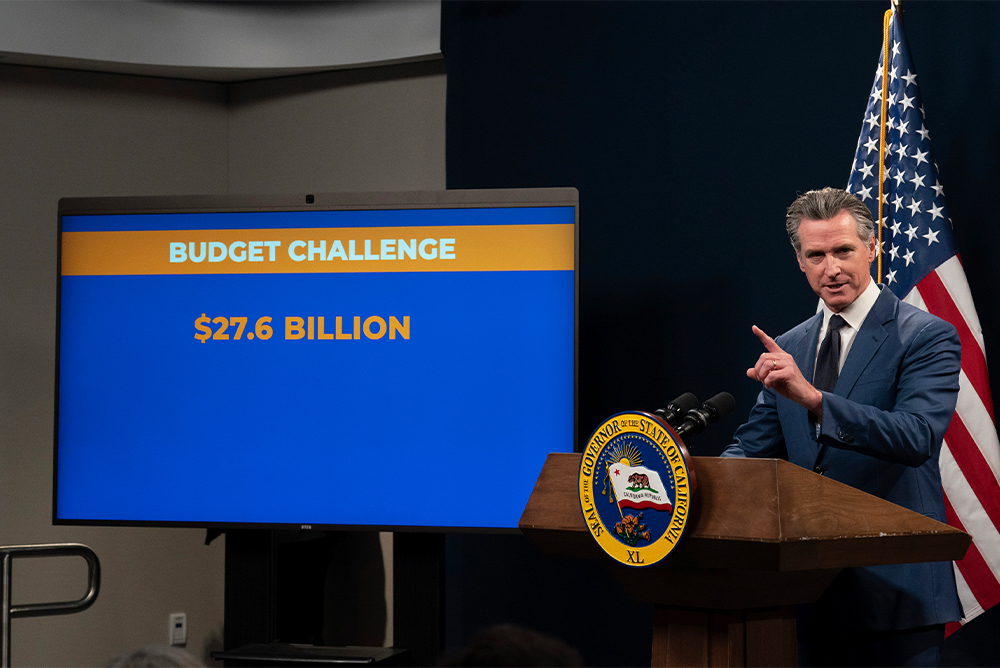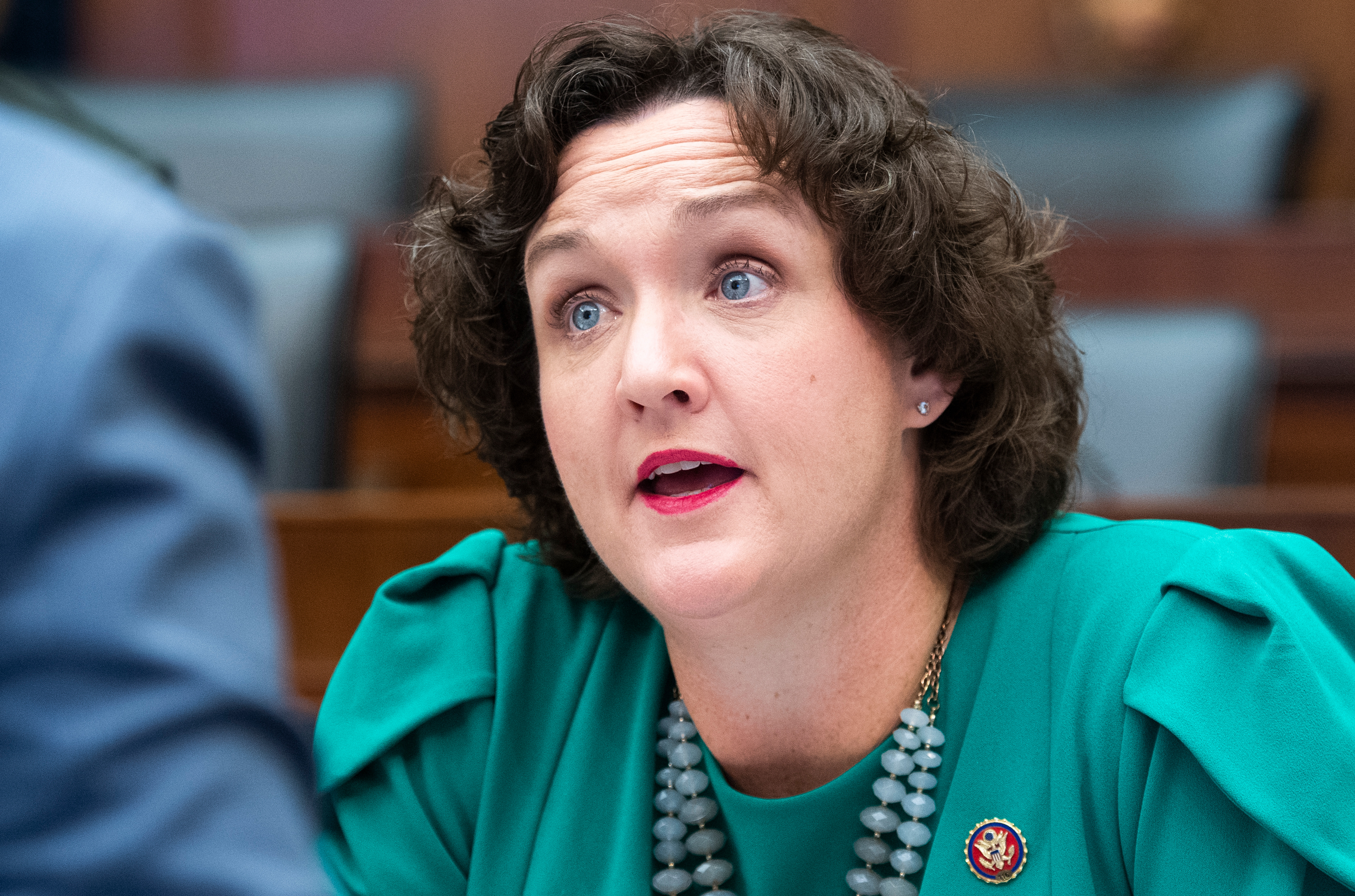California
California McClatchy newspapers endorse Barbara Lee for Senate

California newspapers owned by McClatchy, led by The Sacramento Bee, on Wednesday endorsed Rep. Barbara Lee (D-Calif.) in the Golden State’s Senate primary.
Lee is running against two other House Democrats, Reps. Adam Schiff (Calif.) and Katie Porter (Calif.) in a seat held by Sen. Laphonza Butler (D-Calif). Butler was appointed after Sen. Dianne Feinstein’s (D-Calif.) death and will not pursue reelection.
The opinion boards of the Fresno Bee, Modesto Bee, Merced Sun-Star, The Tribune in San Luis Obispo and The Bee praised Lee’s competitors, calling the House trio “smart, forward-thinking and politically courageous.”
“Ultimately, though, Barbara Lee stood out from the rest. Her independence, her perseverance in fighting for the underdog and her life experiences set her apart,” the opinion piece states.
The newspapers praised Lee’s life experiences that “informed” her politics, anti-war stances and being “well-versed in the nuts and bolts” of running a government.
“She’s strong on access to housing — she served on a housing subcommittee for 11 years — and she advocates for gun control measures,” they wrote. “Lee is an idealist and a truth-teller; she’s often compared to Sen. Bernie Sanders (I-Vt.) — minus the curmudgeonliness.”
They acknowledged that her effort to win the seat will “not be so easy.”
According to a Berkeley IGS poll released released Friday, Schiff is favored by 21 percent of California voters. Porter won 17 percent in the poll, while Lee got nine percent of support. Schiff got a notable bump on Sunday when he was endorsed by The Los Angeles Times, the state’s largest newspaper.
The California Senate race is non-partisan, meaning both Democrats and Republicans will be on the same ballot.
The top GOP candidate in the race is Steve Garvey, a former Los Angeles Dodgers player who amassed 13 percent support in the Berkley poll. The board went after him for having “no political experience,” but noted that he can get enough votes to advance.
The race’s primary is March 5, on Super Tuesday. The top two candidates will advance to the general election, no matter which party they belong to.
Copyright 2023 Nexstar Media Inc. All rights reserved. This material may not be published, broadcast, rewritten, or redistributed.

California
Former California water official pleads guilty to conspiring to steal water from irrigation canal

A former California water official has pleaded guilty to conspiring to steal water in a deal with federal prosecutors in the state’s crop-rich Central Valley.
The Los Angeles Times reports Tuesday that 78-year-old Dennis Falaschi, who used to head the Panoche Water District, entered the plea in federal court in Fresno. He also pleaded guilty to filing a false tax return.
Falaschi was accused in a case that alleged that more than $25 million in water was stolen over two decades when it was siphoned from a federal irrigation canal through a secret pipe and sold to farmers and other water districts. The Panoche Water District supplies irrigation for farmland in Fresno and Merced counties — much of it from the federal Delta-Mendota canal.
Authorities said in court documents that Falaschi wasn’t the only one taking water, but did not specify who else was involved. They estimated Falaschi stole less than $3.5 million in water, a small portion of what they initially alleged had been stolen.
The case comes as California has embarked on a yearslong effort to conserve water use by passing a groundbreaking law to regulate groundwater pumping, encouraging urban users to replace thirsty lawns with more drought-friendly landscaping and ramping up water storage efforts to help the state navigate expected dry years ahead.
The state moved to reduce groundwater use after overpumping led farmers to drill deeper for water and some rural wells to grow dry. The prospect of pumping limits has worried California farmers who grow much of the country’s fresh produce.
Falaschi, who has agreed to cooperate with federal prosecutors in any additional investigations, is scheduled to be sentenced in September. He declined to speak with the newspaper after Tuesday’s hearing.
Assistant U.S. Attorney Joseph D. Barton also declined to comment.
California
California wants to be carbon-neutral by 2045. What does that mean for its big economic drivers?

California’s governor, Gavin Newsom, flew more 6,000 miles to Rome this month to deliver a brief speech on climate change at a Vatican-sponsored conference.
Media reports of Newsom’s appearance centered on his verbal potshot at former President Donald Trump and his conversation with Pope Francis who, Newsom said, praised his unilateral suspension of executions in California.
However, the governor did devote a little time to climate change, mostly reiterating his villainization of the oil industry.
“It’s because of the burning of gas, the burning of coal, the burning of oil,” Newsom said. “We have the tools. We have the technology. We have the capacity to address the issue at a global scale and they’ve been fighting every single advancement and we have got to call that out.”
At this point, we should remind ourselves that Newsom’s constant gallivanting to polish his image as a political heavyweight depends on planes and automobiles that burn petroleum. Nevertheless, he has proclaimed that California will by 2045, just 21 years hence, become carbon emission-neutral.
In 2022, the state Air Resources Board issued a “scoping plan” with multiple precise steps to achieve the goal. Newsom hailed it as “a comprehensive roadmap to achieve a pollution-free future” and, with characteristic hyperbole, “the most ambitious set of climate goals of any jurisdiction in the world … (that could) spur an economic transformation akin to the industrial revolution.”
That’s a lot to be done in just a couple of decades, and there’s not been a particularly noticeable amount of progress. In fact, there’s been some regression.
It’s questionable whether California will have enough power from solar panels and windmills not only to fill current demand but supply additional juice for the many millions of battery-powered cars and trucks that the plan envisions.
Fearing blackouts, Newsom pressed to keep some natural gas-fired power plants and the state’s only nuclear-powered plant operating past their planned phaseout dates. Electric car sales have languished, even though automakers are supposed to quit selling gasoline- and diesel-powered vehicles in just 11 years. Car buyers are leery because the state still has only a fraction of the recharging stations conversion requires.
Furthermore, to deal with a budget crisis, Newsom has slashed spending on climate change programs.
One of the biggest unknowns about a carbon-neutral future, however, is the impact on economic sectors that depend on transportation. A new report on one of those sectors, Southern California’s logistics industry, frames the issue.
A half-century ago, Southern California’s leaders bet the region’s future on the twin ports of Los Angeles and Long Beach becoming the nation’s primary conduit for trade with Asia, and the transportation and warehousing facilities to handle cargo.
The new report from the California Center for Jobs and the Economy, an offshoot of the California Business Roundtable, reveals how impressively that goal has been achieved.
What it terms the “regional trade cluster” is the region’s largest single source of employment, supporting 1.85 million jobs, two-thirds of which require only a high school education or less – an important characteristic given its huge immigrant population.
However, global transportation is a cutthroat business and the twin ports have seen their traffic decline in recent years due to competition from ports with lower operational costs. The sector is also being pressed by state and local authorities to convert ships, trucks, locomotives and other machinery to low- or no-emission propulsion, at huge cost. There has been a backlash against the massive warehouse complexes in inland areas.
Can the industry undergo the massive conversion Newsom’s plan envisions in just 21 years – without becoming terminally uncompetitive and shedding the jobs on which so many of the region’s families depend?
It’s a microcosm of the larger uncertainty.
Dan Walters is a CalMatters columnist.
California
California’s Budget Deficit Is Not the Problem | Connecting California

California’s constitution is full of guarantees and formulas that ratchet up spending on favored programs, writes columnist Joe Mathews, even when revenues drop and the budget is out of balance. California Governor Gavin Newsom during a news conference on May 10, 2024. Courtesy of AP Photo/Rich Pedroncelli.
You can tune out Gov. Newsom when he talks about the state’s big budget deficit. Ignore the pleas of Democrats who control the legislature, too. And turn the volume down when Sacramento lobbies complain about the proposed cuts.
California’s ballooning budget deficits, and the cuts to services they cause, are not a crisis. They are not really news. They are, sadly, normal and predictable.
And they are grounded not in budgeting mistakes—lapses of discipline in collecting revenue or controlling spending—but in our state constitution and in a reality so paradoxical it would make Kafka blush:
Our constitution requires the state to balance its budget. But balancing the state budget requires violating the state constitution.
How’s that? Because on fiscal matters, our constitution is effectively a ratchet. The document is full of guarantees and formulas, approved by voters, that ratchet up spending on favored programs, even when revenues drop and the state budget is out of balance.
Meanwhile, the constitution also has plenty of voter-approved limits on taxes and fees. These limits ratchet down revenues in slower economic times and make it harder for the state and local governments to raise revenues to cover budget increases.
Californians may have forgotten about the ratchet. The past decade was an unusual one for the state budget, as stock market growth and federal pandemic relief sent government revenues soaring and created surpluses.
But with those revenue sources gone or declining, California’s Kafkaesque constitution is reasserting itself and producing deficits projected recently to range anywhere from $27 billion to $70 billion.
That leaves Gov. Newsom stuck and left to do with the budget what all California governors must:
Violate the constitution.
First, he’s not offering a balanced budget. The spending delays, draw-downs on reserves, and cuts he’s proposing to state operations eliminate only about half of the deficit.
Second, to close the gap, he’s violating the state’s education funding guarantee, a voter-approved formula called Prop 98.
Our constitution requires the state to balance its budget. But balancing the state budget requires violating the state constitution.
Prop 98 is, famously, so complicated that no one really understands it. (It involves three complex formulas to determine state funding, and it’s never clear really clear which formula will apply in which year.) The main effect of Prop 98 is to keep pushing education spending up; it’s one of the biggest spending ratchets in our constitutional budget ratchet.
Newsom’s maneuver is a sneaky ploy to reduce Prop 98’s ratchet effect by changing the inputs to the formula. Newsom’s budget proposes to travel back in time and reclassify certain moneys spent on education in previous years as non-education spending.
This maneuver is intended to lower the funding base underneath the formulas—helping him “balance the budget” while allowing the ratchet to do its work.
The problem (besides the inherent ridiculousness of having to bend the law in this manner) is that the lower funding base would mean tens of billions less in school funding in future years.
Yes, my fellow Californians, “screw the kids” remains the real, if unofficial, state motto.
The powerful education lobby is crying foul, as are some Democrats and local governments. Newsom defends himself by saying he’s required to balance the budget.
The problem with this blame game—and demands that Newsom reverse the cuts—is that it defines the discussion as being about the budget. The real problem is California’s broken constitution.
Finding tens of billions of dollars in cuts for anything is hard. Health programs have all kinds of court-ordered, statutory, and, in some cases, constitutional protections. Cuts to prisons and state agencies require concessions from politically powerful labor unions. Tax increases run up against Prop 13 and other state revenue limits.
That doesn’t mean I’m trying to let Newsom, the Democratic supermajority in the legislature, and other powerful Sacramento interests off the hook for the state’s budget problems. It’s the exact opposite. The governor, Democrats, and interest groups are responsible for the budget mess—because they’ve had plenty of time to fix the constitution, and haven’t even tried.
Gavin Newsom has been in statewide office since 2011. California Democrats have had full control of Sacramento since that same year. And powerful unions and other lobbies have held sway for far longer than that.
All of these politicians and lobbies know very well that the California constitution is broken. They have long had the power to come together and give the state the new constitution it needs—without all the fiscal ratchets that drive up spending and limit revenues.
But they haven’t been willing to lead and change the system. They have focused instead on building their own power within this broken system. Jerry Brown and other California leaders have spent the past decades dismissing calls for a constitutional rewrite (including my own, via the book California Crackup) as unrealistic.
But state leaders are the ones who have lost touch with reality. They claim they can fix the budget, but they can’t because the constitution won’t let them. And they won’t fix the constitution because they say it’s politically impossible. How long can they keep saying this—and keep pretending they are doing their jobs?
When the governor and legislators say they are trying to solve the problem, they aren’t telling the truth. This miserable budget, full of cuts to education, is a product of the budget system, and the constitution, that they themselves have chosen.
-

 Movie Reviews1 week ago
Movie Reviews1 week ago‘The Substance’ Review: An Excellent Demi Moore Helps Sustain Coralie Fargeat’s Stylish but Redundant Body Horror
-

 Movie Reviews1 week ago
Movie Reviews1 week ago‘Rumours’ Review: Cate Blanchett and Alicia Vikander Play Clueless World Leaders in Guy Maddin’s Very Funny, Truly Silly Dark Comedy
-

 Culture1 week ago
Culture1 week agoFrom Dairy Daddies to Trash Pandas: How branding creates fans for lower-league baseball teams
-

 News1 week ago
News1 week agoVideo: A Student Protester Facing Disciplinary Action Has ‘No Regrets’
-

 Movie Reviews1 week ago
Movie Reviews1 week ago‘Blue Sun Palace’ Review: An Intimate, Affecting and Dogma-Free Portrait of Chinese Immigrants in Working-Class New York
-

 World1 week ago
World1 week agoPanic in Bishkek: Why were Pakistani students attacked in Kyrgyzstan?
-

 Politics1 week ago
Politics1 week agoAnti-Israel agitators interrupt Blinken Senate testimony, hauled out by Capitol police
-

 Politics7 days ago
Politics7 days agoMichael Cohen swore he had nothing derogatory on Trump, his ex-lawyer says – another lie – as testimony ends



















